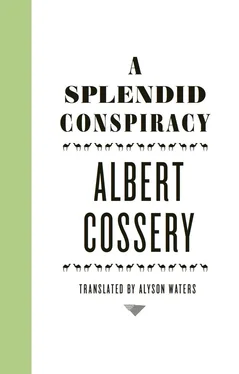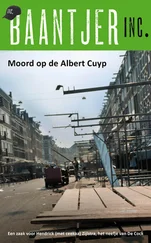Felfel had not noticed Chawki’s presence. She thought that the sudden distress she saw on her brother’s face was an indication of some searing physical pain. She asked with emotion and tenderness:
“What’s wrong? Do you feel ill?”
Rezk tried to control his anger so as not to alarm the young girl. He had never told Felfel about the contemptible incident that had occurred years ago and had caused his unflagging hatred for his father’s tormenter. It was a secret he kept jealously to himself. Not a soul in this city was aware of this most awful, debilitating illness tearing at his flesh. He laughed a tiny, sardonic laugh, as if he were making fun of an inconsequential, fleeting pain.
“It’s nothing,” he said, with a quick, gentle caress to his sister’s cheek. “Well, I’ll be on my way. I’ll see you at home later.”
For a brief moment Felfel watched him cross the street with pity in her eyes; she felt remorse for having let him leave in this pained state. She had a fanatical and fierce love for her brother, strengthened by the complicity of an impoverished existence that led them to share the least morsel of bread, the slightest tidbit that fell from the sky. He was the sweetest, most understanding human being she knew, someone in whom she could confide wholeheartedly and to whom she had given all her adulation until Teymour had appeared on the café terrace, filling her with breathtaking hope.
As she shot out onto the wide deserted square, she saw him in the distance, standing in front of the statue with that magnificent casualness that somehow reflected his extreme scorn of the world, and her heart grew weak with worry. She attempted to pedal even more quickly, as forcefully as she could, as if she feared seeing him suddenly vanish, carried off by the breeze.
Having arrived in front of the young man, she braked sharply and looked at him with childish glee, as if she were filled with wonder at finding him still standing there, waiting for her.
“Climb on quick,” she said breathlessly, pointing to the rear luggage rack.
Teymour smiled at her, incredulous; he was undecided about the girl’s invitation. He was hesitant to let himself be pulled along by her; it seemed as indecent as letting himself be carried by an old man. This was not the first time her behavior had surprised him but he decided that the situation was too amusing to turn down her offer. Laughing at himself, he straddled the luggage rack and, gently grasping the young girl’s slender hips, he tried to lighten her load by tensing his limbs, knowing all the while it was futile. Felfel began to pedal again, but more slowly now; one felt that this extra burden weighed on the impetuous movements of her legs, reducing her usual virtuosity to nil. She rode through the square, passed close to the metal bridge, then turned sharply to the right, taking the road that ran above the river. Having appeared for a brief instant, the sun tucked itself behind a cloud and the air, imbued with the scent of the sea, suddenly took on a chill. Teymour, busy trying to keep his balance, hadn’t yet exchanged a single word with his companion. Although the few pedestrians strolling along the road didn’t seem the type to develop critical opinions, he was ashamed of his hardly glorious position and tried at first to hide his face behind his driver’s back. Soon, however, he relaxed and allowed himself to be carried along in all tranquility; he had just rediscovered his old enthusiasm for this device with its light and supple machine-work that had been the joy of his teenage years.
Felfel stopped in front of the entrance to a public park and turned to Teymour to let him know the ride was over. They got off the bicycle and went to lean it against a tree, then followed a dirt path down to the riverbank. The young girl was seeking the right place for intimacy and she led Teymour to the foot of a dwarf date palm whose broad leaves provided natural protection from the impudence of voyeurs lying in wait behind the parapet of the high road. They sat down in the grass and remained silent for a long time, gazing at the muddy water of the river dotted with tiny waves as it flowed into the nearby sea. In front of them, very close to the opposite bank, a lone sailboat was making its way with age-old laziness. Suddenly the sun reappeared, lighting up the triangular sail with such uncommon brilliance that it looked like a magical bird. Felfel was bursting with tenderness, but she was also in awe of the young man sitting next to her, indolent and nostalgic, like a rich king for whom her humble offering was of no interest. Now that she was alone with him, beneath the shelter of this date palm whose wide leaves protected them from the intrusion of the hostile world she despised, a feeling of reserve and modesty prevented her from confessing all her love, and her great fear of losing him. She could not know that, far from being indifferent to her presence, Teymour was savoring with exquisite sensual delight the brand new emotions aroused by his adventure with the young girl. Because she had freed him from the obligation of spouting the lies that, since the beginning of time, were meant to serve as a prelude to lovemaking, he was deeply grateful. He needed no lies, no insidiousness in his approach to seduce this young, primitive creature who had come to him without wile or ruse. He forgave her ahead of time everything she would do or say over the course of their short or long affair, because she would never be the enemy of whom one had to be suspicious, but always the child who needed to be protected and loved in complete confidence. Reaching out his arm, he squeezed the young girl’s shoulders, then leaned in and kissed her softly on the cheek. She did not move, but felt glad, full of secret joy.
“I’m happy to be here with you,” he said.
Felfel did not answer. She was looking directly ahead of her, staring at the boat with its white sail, which was now beginning to resemble a motionless kite in the azure. Suddenly, without turning her head toward Teymour, she said in a voice as faint as a murmur:
“When are you leaving?”
The question disconcerted him and it took him some time to reply.
“Who told you I intended to leave?”
“I don’t need to be told. I know you won’t stay in this city for long.”
“What makes you think that?”
“Because it’s not a city for you. I’m sure you’re dreaming of leaving here as quickly as possible.”
“No, you’re wrong. I’ve come back to stay.”
“That’s not true,” said Felfel with the stubbornness of a little girl. “You’re just saying that so I won’t be hurt. But I have a premonition you’ll be leaving soon. How can a guy like you be happy in such a hateful place!”
Teymour smiled at the young girl’s obstinacy; he didn’t understand where she had got the idea that he wanted to leave.
“I’m very happy, I swear.”
“You’ll leave; I knew that the first day I saw you on the café terrace. You looked like an orphan.”
“You’re right,” said Teymour, laughing. “I cut a sorry figure. It was the first time I had been out and I wasn’t yet used to the change.” He stopped laughing and held the girl closer to him. “I was stupid. But that’s over. I love this city and want to live here.”
She turned and looked at him with a kind of commiseration mixed with anxiety, as if he had just said something totally absurd.
“I’m not lying,” the young man said. “Listen, I’m going to tell you something that will prove it to you: I’m looking for a place to live.”
“Why? Don’t you want to live with your parents any more?”
“I need a place where I’ll be freer. Somewhere we can see each other in peace. Do you understand? I’m even counting on you to find it for me. Look for something in the old city; it will be more discreet.”
Читать дальше












